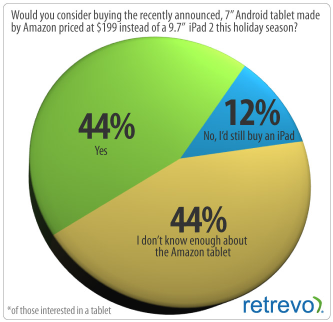How Technology and Markets Made Net Neutrality Moot
Before the courts have even ruled on Verizon’s lawsuit against the FCC‘s proposed Net Neutrality regulations, it appears that technological progress will make the wireless device neutrality portion of the FCC rules moot. One of the key aspects of Net Neutrality was the effort to curb the proliferation of “walled garden” wireless carrier networks. Internet industry players feared that the proliferation of closed proprietary networks would limit their direct access to customers over the Internet and they supported FCC regulation that would forbid wireless carriers from imposing any network limitations on devices.
Even if the network limitations were requested by the device maker and customers liked the limited but inexpensive 3G access, these devices and services were threatened by FCC Net Neutrality regulation. When I was interviewed last year by NPR’s Laura Sydell regarding the FCC’s Net Neutrality proposal,  I raised the concern that Net Neutrality would essentially outlaw popular devices like the Amazon Kindle e-Reader. Sydell responded that closed Internet devices like the Kindle should be outlawed by the Government. I disagreed and argued that the market and technology were the best arbitrators in this dispute and it appears that I was right.
I raised the concern that Net Neutrality would essentially outlaw popular devices like the Amazon Kindle e-Reader. Sydell responded that closed Internet devices like the Kindle should be outlawed by the Government. I disagreed and argued that the market and technology were the best arbitrators in this dispute and it appears that I was right.
The first three generations of the Kindle e-Reader were limited enough in capability that it was possible to offer limited 3G wireless access to text and low quality images. Now that the Amazon Kindle Fire has transitioned to a color display and dual-core microprocessor capable of rendering high quality images and High Definition (HD) video, it’s doubtful that future generations of Amazon e-Readers will not come with lifetime access to a limited Internet. With hot pre-order numbers for the color Kindle Fire and abysmal pre-order numbers for the Kindle Touch 3G, the future of walled garden Internet devices is almost certainly dead.
 It’s also notable that the FCC had also considered regulating Apple’s App Store on behalf of Google in 2009. That discussion came up in my interview with Laura Sydell and she expressed her enthusiasm for app store regulation as well. But it appears that my faith in a market based approach will be proven correct and that any excessive market control exerted by Apple will be contained by the market place.
It’s also notable that the FCC had also considered regulating Apple’s App Store on behalf of Google in 2009. That discussion came up in my interview with Laura Sydell and she expressed her enthusiasm for app store regulation as well. But it appears that my faith in a market based approach will be proven correct and that any excessive market control exerted by Apple will be contained by the market place.
When Apple revolutionized the phone and wireless industry in 2007 with the Apple iPhone, Apple appeared untouchable. Only 4 years later, Apple has slipped to third place with a mere 20% market share in smartphones.
In 2010 when Apple’s iPad succeeded in the Tablet computing space where all others have failed before them, Apple appeared untouchable. Just one year later Android devices have crept up to a 27% market share. Even more ominous for the iPad’s dominance is survey data from Retrevo indicating that the Amazon Kindle Fire could outsell Apple’s iPad this holiday season. The lesson in all of this is that technology and the market can move swiftly and wisely before the ink on any new regulation is dry.




I don’t think the neutrality advocates regard the issue moot just quite yet, do you? They’re pretty upset about the Verizon “Turbo Button,” and it’s not even live yet.
The success of Android has certainly made the Apple walled garden “moot” in the raw numbers sense, but they still complain about it because it’s so much more successful than the Android Market at putting cash in developers’ pockets.
Take a step beyond raw market shares and look at who’s making the money in the mobile space and you’ll see that the walled garden is alive and well for ordinary people.
I never claimed that the advocates will claim the issue is or will ever be moot. I made that assertion based on these specific examples where Net Neutrality advocates advocated banning devices like the Amazon Kindle with 3G, and I cited evidence of how this issue is moot.
As for the Apple App store, I personally don’t shop there but I don’t believe that the FCC should interfere with Apple’s decisions in the App store. Would you disagree with that opinion?
What I am saying is that Apple no longer has the kind of dominance they once had and part of that is due to the fact that the market and customers reject Apple’s aggressiveness in trying to control everything. What I am saying is that the market is the superior arbitrar and that regulators are not good arbitrars.
One of the astonishing things about net neutrality is the remarkable flexibility of the term. It’s been applied to everything from an “all packets are equal” mandate to a proposed ban on app stores. The app store ban never got any traction, and pretty well collapsed when the advocates were forced to realize that iTunes and Android Market aren’t controlled by carriers.
So the idea that net neutrality doesn’t matter because Apple is losing market share doesn’t hold water. Not only is it not verifiable (the 4th quarter numbers are likely to show Apple gaining considerable market share,) but there’s that pesky question of the profits that I mentioned in my previous post.
In other words, net neutrality has more to do with carrier behavior, real and imaginary, than with app stores and handset market shares.
You’re missing the point that Net Neutrality unavoidably bleeds into device makers and app store owners and that there really isn’t a way to separate the two. Case in point, the carrier offers incentives to the device maker and/or App Store owner to have devices and applications operate a certain way (e.g., more network friendly to the carrier in both in engineering and economic terms). Then it is the device maker and app store owner that implements the network restrictions. So you are grossly oversimplifying the issue by saying that it is only a carrier issue when the reality is so much more intertwined.
The advocates of Net Neutrality regulations are well aware of this inseparable relationship but they also understand that there are jurisdictional limitations of the FCC. So the regulations are written to pertain to the carrier but have deliberate implications for the device maker and app store owner, but the actual implementation of the rules (which are still up in the air) gets blurry.
But now that devices like the Amazon Kindle with integrated 3G is losing steam to full color devices capable of video playback, the walled garden 3G model is in fact fading. The prepaid life-of-the-device 3G limited access carrier model is losing out to technological progress which is the point of the article. Because of that, one of the key aspects of Net Neutrality pertaining to wireless networks is becoming moot.
I’ve always found NN dubious simply because it focuses on carriers and leaves all the others untouched. The Internet is an intertwined ecosystem, so there needs to be some basic consistency about the rules.
My point was that anything applied to carriers pertains to the carrier’s customers. Limits on what carriers can impose on devices versus limits on what device makers impose on devices is simply different sides of the same coin.
This is why people like Tim Wu has railed in papers about wireless devices, and going as far as to bemoan the lack of a consistent software developer platform.
I think you’re right that we will see a decrease in the limitations or walls on devices. I think the iPad proved that individuals would rather have a tablet that they could both read on and do other things. And this is evidenced by Amazon’s move to the Fire which as you point out has huge pre-sale numbers.
However, I talked about walled gardens as platforms at DS: http://www.digitalsociety.org/2011/03/facing-the-truth-we-all-love-walled-gardens/ and I just don’t see that going away any time soon. In fact I think we will see an increase in those things, even microcosms of larger walled gardens.
Take last weeks launch of the Call of Duty Elite platform which is essentially a walled garden social network for just COD players that only works within the larger walled gardens of Xbox Live or Playstation Network.
But devices should continue to open more. Which I think will particularly be a boon for IPTV type devices.
Yes, those are software and hardware platforms. The point of this article was that technology made limited access 3G impossible because once the device can do stuff, limits can’t realistically be imposed.
Leaving aside the question of whether NN applies to app stores or not, your article still has a problem. The FCC’s NN rules exempt wireless carriers from most forms of NN scrutiny, so I would argue that the NN rules are moot for wireless regardless of market developments. They were written that way.
There are enough issues pertaining to wireless in the Net Neutrality regulations to prompt several lawsuits, notably Verizon.
Verizon operates a wireline network too.